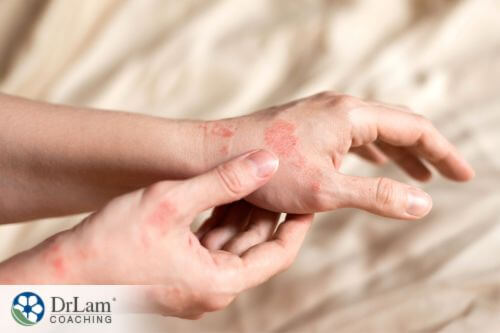 Can stress cause itchy skin? As the largest organ in your body, your skin protects you in several ways. It protects you from the environment by preventing toxic chemicals from entering your body and shields you from impact. The microbiome present on your skin helps to prevent harmful microorganisms from damaging your health. Moreover, the thousands of nerve endings in your skin transmit all your sensations. However, all of this means that your skin is also very much connected with what is going on in your body, and as a result, it is vulnerable to the widespread effects of stress. It should therefore come as no surprise that you can suffer from stress-related skin conditions when your body is under pressure.
Can stress cause itchy skin? As the largest organ in your body, your skin protects you in several ways. It protects you from the environment by preventing toxic chemicals from entering your body and shields you from impact. The microbiome present on your skin helps to prevent harmful microorganisms from damaging your health. Moreover, the thousands of nerve endings in your skin transmit all your sensations. However, all of this means that your skin is also very much connected with what is going on in your body, and as a result, it is vulnerable to the widespread effects of stress. It should therefore come as no surprise that you can suffer from stress-related skin conditions when your body is under pressure.
Two common skin conditions that can develop in times of skin are itchy skin and a stress skin rash. Itchy skin is medically known as pruritus and can be caused by skin conditions and conditions affecting the whole body (1). A stress skin rash can occur with itchy skin or without itchy skin and can be a result of specific skin conditions. This article will explore the question of whether can stress cause itchy skin and/or a stress skin rash and several remedies you can try to get relief.
Simply put, yes stress can affect your skin. This is because your skin is an organ and interacts with all other organs and systems in your body. When your internal organs become dysregulated due to stress, your skin is also affected, resulting in stress-related skin conditions such as itchy skin and/or a stress skin rash.
However, the reasons behind this connection are complex. One built-in mechanism your body uses to manage stress is the NeuroEndoMetabolic (NEM) Stress Response. This consists of six interrelated circuits, each composed of three organs or organ systems.
When you are stressed, your body initiates a process that results in your adrenal glands releasing cortisol and other hormones to prepare your body to fight the stressors. As stress continues and becomes chronic, your adrenal glands can become overwhelmed by the body’s demand for these hormones. Eventually, the adrenal glands become fatigued and unable to keep up with this demand. Imbalances within the NEM system start to occur, marking the beginning of Adrenal Fatigue Syndrome (AFS). This is the non-Addison’s form of adrenal dysfunction, where the body’s stress response cannot keep up with life’s chronic stressors.
Symptoms of AFS will depend on where the imbalance is occurring. When addressing the question of whether stress causes itchy skin, there are two circuits in the NEM system that can contribute to this situation. These are the Inflammation and Detoxification circuits.
This circuit consists of the microbiome, gut, and immune system. It is responsible for the inflammatory reaction that fights pathogens and keeps them out - but it can sometimes lose control. When the Inflammation circuit becomes dysregulated, several events take place that ultimately affect your skin.
 Firstly, the cells lining your gut become compromised, allowing pathogens, viruses, and undigested food particles in, which provides them with access to your bloodstream. This occurs because the normally tight junctions between those cells loosen and begin to leak. This condition is known as leaky gut. This can reduce the absorption of nutrients from your food, resulting in micronutrient deficiencies.
Firstly, the cells lining your gut become compromised, allowing pathogens, viruses, and undigested food particles in, which provides them with access to your bloodstream. This occurs because the normally tight junctions between those cells loosen and begin to leak. This condition is known as leaky gut. This can reduce the absorption of nutrients from your food, resulting in micronutrient deficiencies.
Pathogens can then start to enter your bloodstream. This triggers your immune system to begin its work in destroying the invaders before they can harm you. Part of this process involves causing inflammation to fight the pathogens. However, the number of pathogens attacking your body can sometimes overwhelm your immune system, making it work harder and even become hyperactive. As a result, your immune system not only causes more inflammation, but it can even wrongly identify healthy cells as invaders and attack them. When this happens, autoimmune conditions develop.
Additionally, when your skin microbiome becomes out of balance, it can lead to a condition similar to a leaky gut called “leaky skin”. This leaves you vulnerable to pathogens that inhabit your skin because its role as a protective barrier becomes compromised. When this happens, your immune system launches an attack on these pathogens, resulting in inflammation of your skin.
All these factors can result in itchy skin and/or a stress skin rash.
The Detoxification circuit plays a key role in skin health as well. This circuit consists of the liver, interstitium, and immune system. The role of this circuit is to remove waste products and toxins from your body, essentially keeping your body clean.
There are multiple ways in which an imbalance in the detoxification circuit can cause skin conditions. This circuit, like the Inflammation circuit, affects the gut. An imbalance in this circuit can cause imbalances in levels of beneficial and harmful bacteria in the gut. This can compromise the integrity of the gut cells and cause toxins and waste products to enter the blood. This results in a build-up of waste products and toxins, causing itchy skin and/or a stress skin rash. The reduced integrity of the gut can also cause food sensitivities where itchy skin can be a symptom.
In an imbalanced detoxification circuit, the immune function can become reduced, and it may fail to fight infections. For example, candida in an infection caused by a fungus. With reduced immune system function, this infection can flare up in individuals with a dormant candida infection, resulting in itchy skin.
When exploring the question “can stress cause itchy skin?” it also helps to consider several skin conditions that are caused by stress.
After a particularly stressful day, do you come home with itchy, swollen, pink skin welts? If so, you have joined thousands of other people who experience hives, also known as a stress skin rash. According to the American Academy of Dermatology, hives most commonly result from food allergies, medications, or insect bites, but can also result from stress.
The relationship between stress and hives comes down to your sympathetic nervous system, which becomes activated when you experience stress. This results in the release of histamine, which can then cause hives. Other causes of hives include a detoxification reaction when you are trying to rid your body of toxins, and the toxins are released through your skin, causing itching.
 One of the major causes of this stress-related skin disorder is an overactive immune system, typically resulting from dysbiosis of your gut microbiome. The development of eczema indicates an unhealthy skin microbiome, which weakens your skin’s barrier function, allowing pathogens to cause irritation, itchiness, and a stress skin rash.
One of the major causes of this stress-related skin disorder is an overactive immune system, typically resulting from dysbiosis of your gut microbiome. The development of eczema indicates an unhealthy skin microbiome, which weakens your skin’s barrier function, allowing pathogens to cause irritation, itchiness, and a stress skin rash.
This stress-related skin condition can become chronic and causes thick, red patches on your skin that can become covered in white scales. Stress and worry can make psoriasis worse over time. While stress isn’t thought to cause psoriasis, it can make it worse by triggering increased signaling between the immune, nervous, and endocrine systems. The resulting inflammation leads to increased symptoms of psoriasis.
Adrenal fatigue is caused by chronic stress, and this condition can make you more vulnerable to itchy skin and stress skin rashes as well. Not everyone experiencing AFS will experience skin conditions. But if you are dealing with an imbalance in the Inflammation or Detoxification circuit, you are at higher risk for developing skin conditions.
You may be more likely to develop AFS and subsequent skin conditions if you have experienced some of the following in the last year:
Most of the time, people who suffer from stress-related skin conditions, such as hives, eczema, or psoriasis, visit their dermatologists for relief. Prescriptions for either topical or oral medication to deal with these conditions work for a lot of people. Over-the-counter antihistamines can also be of benefit.
Most of these medications do provide some relief from the symptoms of these skin conditions, but unfortunately, they do not address the underlying root causes.
In the case of someone suffering from AFS and related NEM dysfunction, these medications may actually increase the stress that lies at the foundation of their stress-related skin conditions.
To find natural relief from stress-related itchy skin, the following areas are important to address.
A basic approach to dealing with these kinds of skin conditions involves doing all you can to reduce your overall stress. Some stress reduction activities include:
There are a range of different nutrition strategies that may help to target imbalances within the NEM system, including the adrenal fatigue diet. Most nutritional suggestions focus on:
Supplements can also come in handy to help assist in providing relief from skin conditions. Unlike food, supplements can contain a higher amount of nutrients, and several can help to target itchy skin and stress skin rashes. These supplements include ones that are ingested as well as supplements that can be applied topically to your skin.
Antioxidants like vitamin C and probiotics are both supplements to consider for skin health.
However, do note that if you are dealing with AFS, other health conditions, or are on medication, it is important to proceed with caution when taking new supplements, and it is best to okay them first with your doctor.
 Antioxidants include a large group of different nutrients such as vitamin C, E, zinc, and selenium. Antioxidants help to neutralize free radicals in the body. These are unstable molecules that are produced in response to toxins and stress. These free radicals increase inflammation in the body and can contribute to skin conditions (2).
Antioxidants include a large group of different nutrients such as vitamin C, E, zinc, and selenium. Antioxidants help to neutralize free radicals in the body. These are unstable molecules that are produced in response to toxins and stress. These free radicals increase inflammation in the body and can contribute to skin conditions (2).
Antioxidants help to neutralize free radicals, reduce damage and inflammation, and can help to ease skin symptoms. With an imbalance in the Inflammation and Detoxification circuit, free radicals can be produced. Antioxidants have shown promise in helping to reduce itching and pain related to itching (2).
This class of supplements can be taken orally and is also available topically in the form of cleansers, serums, and creams.
Antioxidant supplements can either contain one specific antioxidant or a combination. The HSN Formula is a supplement that uses a combination of different nutrients that act as antioxidants such as vitamins C, E, B5, B6, zinc, and selenium as well as a combination of plant compounds. This combination of antioxidants helps to reduce inflammation and damage caused by free radicals. This can help to improve skin health.
Gut disbiosis can lead to inflammation, leaky gut, and a variety of skin problems. However, supplementing with probiotics can help to improve the population of beneficial bacteria in your gut. This can help to enhance the integrity of your gut walls and can boost your immune system, thus reducing the frequency of itchy skin and rashes.
A recent study focusing on the effects of probiotics in individuals with itchy skin found that the use of probiotics may help decrease the severity of itchy skin (3).
The question of whether stress causes itchy skin and a stress skin rash is a complex one. It is affected by many different factors. Although stress can cause these skin conditions, there are many other potential causes of itchy skin.
If you suspect stress is a problem, some of these strategies may help to provide relief. Some strategies that can help are:
If you are currently experiencing itchy skin or a stress skin rash and are looking for remedies, you can view our supplementation range here. Additionally, you can contact our team at Dr. Lam for a free initial call, if you would like more guidance on managing your stress and skin health.
Rupert J and Honeycutt JD. “Pruritus: Diagnosis and Management.” Am Fam Physician, vol. 105, no. 1, 2022 Jan. pp. 55-64. https://pubmed.ncbi.nlm.nih.gov/35029946/
Soares B, et al. “Role of Antioxidants in Itch Treatment: Lessons Learned From Pain Management.” Itch, vol. 8, no. 1, 2023 Jan-Mar. pp. 68. https://journals.lww.com/itch/fulltext/2023/01010/role_of_antioxidants_in_itch_treatment__lessons.5.aspx
Sodre CS, et al. “The Effect of Probiotics on the Clinicial Status of Adult Patients with Atopic Dermatitis: A Systematic Review.” Eur J Med Res, vol. 27, 2022 June. pp. 94. https://www.ncbi.nlm.nih.gov/pmc/articles/PMC9199243/
When answering the question of “can stress cause itchy skin,” it is important to remember that this is usually temporary. In some cases, it can last a while. But if the underlying root cause for the itchy skin is addressed, the itchiness can be reduced and potentially stopped.
